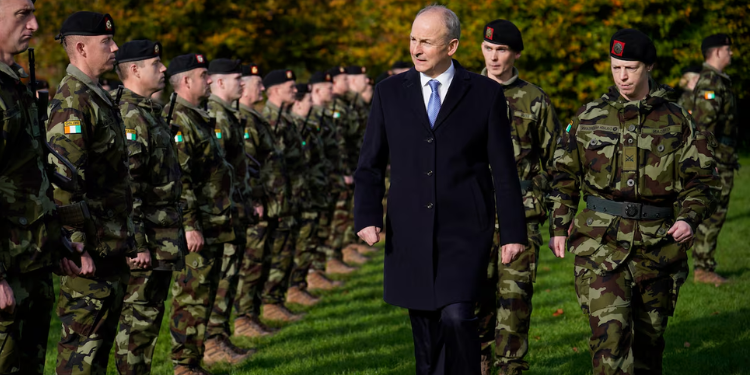Working Time Directive Now Covers Irish Defence Forces Personnel
The Tánaiste and Minister for Defence, Micheál Martin TD, and Minister for Enterprise, Trade & Employment, Peter Burke TD, have announced the implementation of the Working Time Directive (WTD) for Irish Defence Forces personnel. This significant reform ensures statutory protections under the Organisation of Working Time Act, 1997, for Defence Force members, marking a historic step forward in improving their working conditions.
“This is a critical step in transforming the Defence Forces and ensuring the well-being of its members,” said the Tánaiste. The reform extends to most personnel, including reservists, and addresses critical aspects of work-life balance, safety, and fairness.
Reactions from Representative Bodies
RACO Welcomes Progress for Defence Forces
Conor King, General Secretary of RACO, described the removal of the blanket exemption from the WTD as a “historic milestone.” He stated:
“This achievement is the culmination of nearly a decade of advocacy by RACO and PDFORRA on behalf of our members. It involved complex negotiations, relentless engagement, and legal action. The regulatory amendments to Defence Forces Regulation A11, providing rest periods for high-demand activities like Naval Patrols and Special Operations, represent a watershed moment in offering certainty and predictability to members.”
King also welcomed additional measures, such as reunion flights for overseas personnel, enhanced welfare provisions, and mandated rest periods for training courses. “While work remains on defining working hours and implementing an electronic time recording system, today is a significant step in regenerating Óglaigh na hÉireann,” he concluded.
PDFORRA Celebrates Milestone for Enlisted Personnel
PDFORRA, representing over 5.500 enlisted personnel, also celebrated this development. General Secretary Gerard Guinan called it a “milestone for the Defence Forces.”
“PDFORRA has fought long and hard for the equitable implementation of the Working Time Directive for our members, involving court actions, mediation agreements, and extensive negotiations. Today’s decision marks a turning point, offering protections under the Directive, save for where it conflicts with the needs of the State,” Guinan said.
Mark Keane, President of PDFORRA, highlighted specific benefits of the reform, including compensatory rest periods, reunion flights for overseas personnel unable to take leave in-theatre, and enhanced work-life balance measures for naval service members. “These reforms can play a critical role in encouraging recruitment, particularly in the Naval Service, where it is desperately needed,” Keane stated.
PDFORRA also praised the Tánaiste’s letter outlining additional welfare measures, such as public funding for recreational equipment and WiFi access, which were previously covered by personnel themselves. However, they noted that work remains on issues like time-and-attendance systems, leave policies, and core working hours.
“It is only right that those who protect our citizens enjoy, to the greatest extent permissible, the protections afforded by this legislation,” Keane concluded.
EUROMIL Welcomes this Historic Implementation
Emmanuel Jacob, President of EUROMIL, welcomed the historic implementation of the Working Time Directive (WTD) for Defence Forces personnel in Ireland, acknowledging the significant progress it represents for military personnel’s rights and working conditions.
“The implementation of the WTD has been on EUROMIL’s agenda, as well as Ireland’s, for a long time,” Jacob stated. “In 2022, EUROMIL, in support of its Irish member associations PDFORRA and RACO, submitted a collective complaint to the European Committee of Social Rights for a violation of the European Social Charter regarding working time. This complaint remains pending. However, we share the satisfaction of our Irish member associations today as this step marks a pivotal advancement.”
Jacob emphasized the broader implications of this reform for military personnel across Europe. “This achievement once again proves that military personnel should not be excluded from the WTD and other European social regulations. It reinforces the principle that the rights and well-being of those who serve must be respected and protected.”
EUROMIL commends the Irish government, PDFORRA, and RACO for their tireless advocacy and engagement to secure these long-awaited reforms. The organization remains committed to supporting its members across Europe in achieving equitable working conditions and ensuring compliance with European standards for military personnel.
A Step Towards Modernization
Lieutenant General Sean Clancy, Chief of Staff, welcomed the reform as a pivotal step in aligning the Defence Forces with contemporary workplace standards. “This initiative enhances work-life balance, making the Defence Forces a more attractive career choice and strengthening its ability to meet 21st-century challenges,” he stated.
The Tánaiste and Minister Burke acknowledged the unique challenges of military life, emphasizing that appropriate exemptions for specific tasks would be paired with compensatory rest periods and other health and safety measures.
This reform reflects the government’s broader commitment to modernizing the Defence Forces and creating a safe, supportive, and equitable workplace for its personnel.
(More information on the decision can be read here.)

